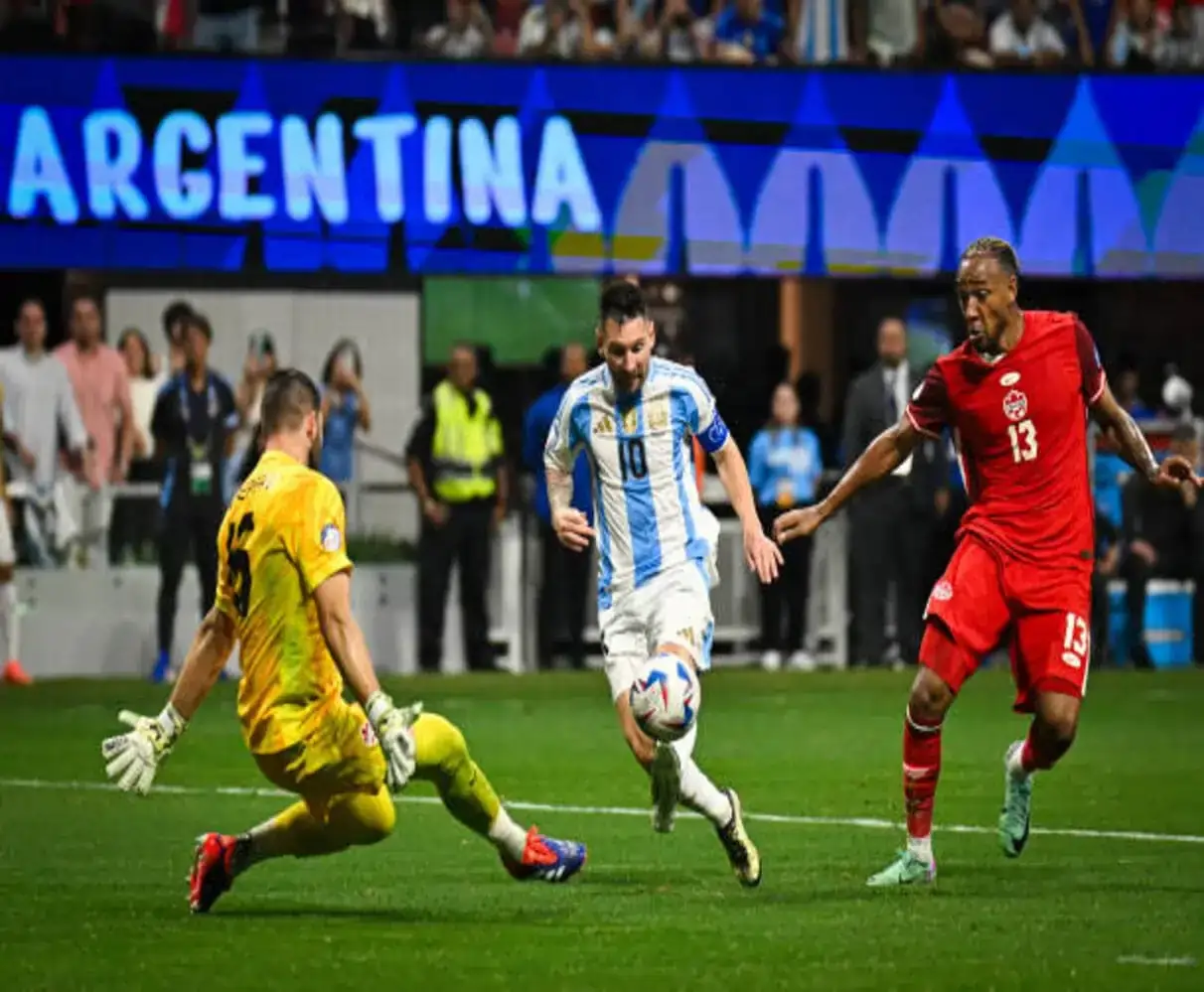
Although it seemed like beach soccer, with so much sand spread across the field of play at the New Jersey stadium, Argentina advanced to the final of the Copa America USA 2024 and was 90 minutes away from a new title. With the best performance in the tournament by Lionel Messi, largely recovered from the injury that had reduced him to an almost secondary role in previous matches, especially in the dramatic quarterfinal against Ecuador, the world champion made a statement and beat Canada 2-0 in a placid semifinal, almost as if it were a first-round match. In fact, in its debut in the Cup, Argentina had also beaten the same rival 2-0.
Also Read: James Rodriguez and His Rebirth With Colombia in the Copa America
At 37 years old, determined to overcome biology and the discomfort in his right adductor that plagued him for much of the Cup, the current Inter Miami player scored his first goal in the tournament, after deflecting a shot from Enzo Fernandez that also seemed headed for the net. It was six minutes into the second half and he finished off a match that Argentina had already won since the 22nd minute of the first half, when Julian Alvarez, the Manchester City forward with the face of a boy scout but a killer instinct in the area, had scored the 1-0.
“With some players, like [Angel] Di Maria, these are the last battles and we are enjoying them to the fullest. The fact that the Argentine national team is in a final is amazing, crazy, very difficult, incredible, and we are enjoying it,” said Lionel Messi after the match, who also highlighted the context of “a very difficult Cup, with very tough teams, difficult pitches and a lot of traveling.”
The selection of Lionels, Messi, and Scaloni, turned into a ministry of happiness for a country in eternal crisis, naturalized the most difficult thing in football winning, and continuing to win. World champion in Qatar 2022 and also defending continental champion that they won in Brazil 2021. Argentina will attempt in next Sunday’s final in Miami – the home of the number 10, precisely – a record that only Spain achieved between 2008 and 2012 three consecutive titles, two continental titles, and a World Cup.
Argentina’s opponent will be decided this Wednesday in a fascinating semi-final in Charlotte, North Carolina, between Colombia and Uruguay, both of whom – along with Argentina – have been the best teams in the tournament. For Messi and his boys, it will also be an unknown challenge in their time in the United States due to a peculiar fixture designed by Conmebol, Argentina avoided the two groups with the most dangerous teams. An innocuous Brazil, in fact, was eliminated by Marcelo Bielsa’s brave Celeste.
But just as Conmebol celebrates Messi and Argentina being in the final, FIFA will have to take note for the 2026 World Cup – and also for the 2025 Club World Cup – that it cannot repeat one of the already characteristic postcards of this Copa America like so many other playing fields patched between natural and synthetic grass, the New Jersey stadium – filled with 80,000 spectators – looked like a children’s sandbox. Or a little field in the neighborhood for friends.
With each pass, the ball raised a trail of sand, not to mention when the players swept the pitch. Beyond affecting the level of play, which is no small thing for the spectacle, it also poses a danger to the health of the players. Coincidentally or not, Messi himself was injured in this stadium in Argentina’s second match, against Chile.
Without shining, but with personality and solidity, the world champion swept away some – or many – of the doubts that had been left against Ecuador, when Emiliano Dibu Martinez had to resort to his specialty in penalties. Part of the second or third-world platoon, Canada – a team with more physique than talent – tried to make Argentina uncomfortable based on the speed of some of its players, especially Alphonso Davies, from Bayern Munich, but only succeeded at the start of the match.
On tiptoe, Argentina resembles those hunters who allow themselves to speculate and play with their prey. A very good pass from Rodrigo de Paul was enough for Alvarez to outpace Derek Cornelius, defender of Malmo FF of Sweden, in speed and liveliness and define between the legs of Maxime Crepeau, goalkeeper of Portland Timbers, to convert a 1-0 that seemed like a checkmate.
With some good partnerships between Messi and Angel Di Maria, who announced his retirement from the national team after the Copa America, Argentina did not need to be at their best to take control of the night, especially from the midfield between Enzo Fernandez and De Paul, both of good level. Although neither the Albiceleste nor Messi are close to what they showed in Qatar 2022, this time the match had 30 minutes to spare, an unusual superiority in any national team match, especially in a Copa America semi-final, a much tougher tournament than one might think.
At the end of the night, when Argentina was already in another final, the players hugged each other in the middle of the field and began to sing, as if they were supporters, “On Sunday, whatever the cost, on Sunday we have to win.” Messi’s complete works with the national team seem to have one last chapter left, or the penultimate one if he also decides to play in the 2026 World Cup. The final call for the number 10 again.
